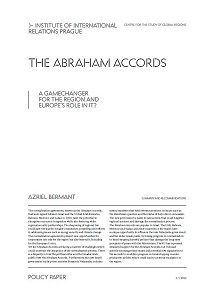The Abraham Accords: a game changer for the region and Europe’s role in it?
The Abraham Accords: a game changer for the region and Europe’s role in it?
Author(s): AZRIEL BERMANT
Subject(s): Government/Political systems, International relations/trade, Security and defense, Military policy, Political behavior, Comparative politics, Peace and Conflict Studies
Published by: Ústav mezinárodních vztahů
Keywords: Abraham Accords; normalization agreements; regional cooperations; Israel; Arab states; EU; Palestine;
Summary/Abstract: The normalization agreements, known as the Abraham Accords, that were signed between Israel and the United Arab Emirates, Bahrain, Morocco and Sudan in 2020, have the potential to strengthen economic integration while also fostering wider regional security partnerships. The deepening of regional ties could pave the way for broader cooperation propelling joint efforts in addressing issues such as energy security and climate change. The normalization agreements present new opportunities for cooperation not only for the region but also beyond it, including for the European Union. Yet the Abraham Accords are facing a number of challenges which could constrain the expansion of the normalization process. There is a disparity in how the political elites and the broader Arab public view the Abraham Accords. Furthermore, the new Israeli government led by prime minister Binyamin Netanyahu includes several members that hold extreme positions on issues such as the Palestinian question and the status of holy sites in Jerusalem. The new government is liable to take actions that could heighten regional tensions and damage the normalization process. The Abraham Accords are popular in Israel. The UAE, Bahrain, Morocco and Sudan and other countries in the region have a unique opportunity to influence the new Netanyahu government and the wider Israeli public by linking progress on normalization to Israel stopping harmful policies that damage the long-term prospects of peace with the Palestinians. The EU has expressed measured support for the Abraham Accords, but it should actively encourage these states and potential new signatories to the accords to condition progress on Israel stopping counter-productive policies which could lead to a serious escalation in the region.
Series: IIR - POLICY PAPERS
- Page Count: 9
- Publication Year: 2023
- Language: English
- Content File-PDF

